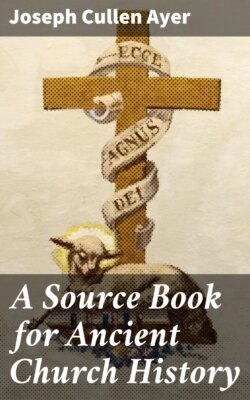Читать книгу A Source Book for Ancient Church History - Joseph Cullen Ayer - Страница 112
На сайте Литреса книга снята с продажи.
(b) Tertullian, De Prœscriptione, 20, 21. (MSL, 2:38.)
ОглавлениеTertullian worked out in legal fashion the argument of Irenæus from the testimony of the bishops in apostolic churches. He may have obtained the argument from Irenæus, as he was evidently acquainted with his works. From Tertullian's use of the argument it became a permanent element in the thought of the West.
Ch. 20. The Apostles founded in the several cities churches from which the other churches have henceforth borrowed the shoot of faith and seeds of teaching and do daily borrow [pg 115] that they may become churches; and it is from this fact that they also will be counted as apostolic, being the offspring of apostolic churches. Every kind of thing must be judged by reference to its origin. Therefore so many and so great churches are all one, being from that first Church which is from the Apostles. Thus they are all primitive and all apostolic, since they altogether are approved by their unity, and they have the communion of peace, the title of brotherhood, and the interchange of hospitality, and they are governed by no other rule than the single tradition of the same mystery.
Ch. 21. Here, then, we enter our demurrer, that if the Lord Jesus Christ sent Apostles to preach, others than those whom Christ appointed ought not to be received as preachers. For no man knoweth the Father save the Son and he to whom the Son has revealed Him [cf. Luke 10:22]; nor does it appear that the Son has revealed Him unto any others than the Apostles, whom He sent forth to preach what, of course, He had revealed to them. Now, what they should preach, that is, what Christ revealed to them, can, as I must likewise here enter as a demurrer, properly be proved in no other way than by those very churches which the Apostles themselves founded by preaching to them, both viva voce, as the phrase is, and subsequently by epistles. If this is so, it is evident that all doctrine which agrees with those apostolic churches, the wombs and origins of the faith, must be reckoned for truth, as undoubtedly containing what the churches received from the Apostles, the Apostles from Christ, Christ from God. There remains, therefore, for us to show whether our doctrine, the rule of which we have given above [v. infra, § 29, c], agrees with the tradition of the Apostles, and likewise whether the others come from deceit. We hold fast to the apostolic churches, because in none is there a different doctrine; this is the witness of the truth.
